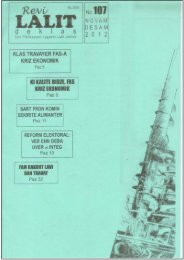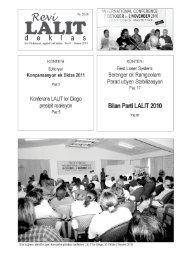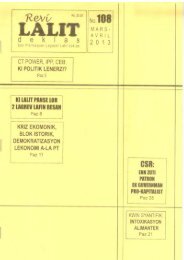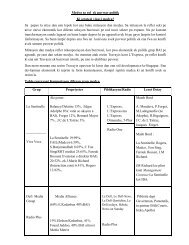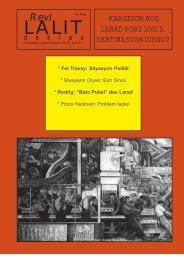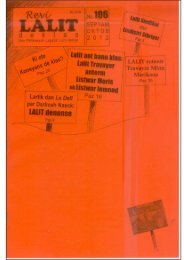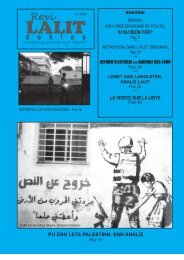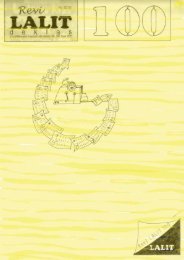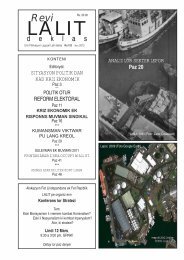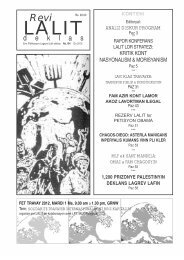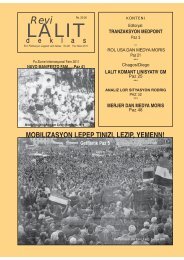Against communalism of the best-loser system - Lalit Mauritius
Against communalism of the best-loser system - Lalit Mauritius
Against communalism of the best-loser system - Lalit Mauritius
You also want an ePaper? Increase the reach of your titles
YUMPU automatically turns print PDFs into web optimized ePapers that Google loves.
eal) equality before <strong>the</strong> law are <strong>the</strong> results <strong>of</strong> radical political struggles involving <strong>of</strong>ten mass<br />
participation <strong>of</strong> <strong>the</strong> exploited and oppressed. No doubt an impressive achievement when<br />
contrasted with <strong>the</strong> recent reality <strong>of</strong> colonial rule and our past history <strong>of</strong> a plantation society<br />
based on slavery and indentured labour. Still, such an achievement must not blind us to <strong>the</strong><br />
imperfections and <strong>the</strong>ir malignant consequences.<br />
The Poison<br />
The <strong>best</strong> <strong>loser</strong> <strong>system</strong> is such an imperfection. It is an anti-democratic poison in our<br />
parliamentary and electoral <strong>system</strong>s. It transforms <strong>the</strong> electorate into a sum <strong>of</strong> communal<br />
categories and <strong>the</strong> individual citizen is no more an adult with <strong>the</strong> political right to vote and<br />
choose a political representative, but becomes, above all, a sectarian unit who will be<br />
represented by somebody who apparently shares <strong>the</strong> same sectarian identity.<br />
Indeed, as will be shown, it is a poison that corrupts <strong>the</strong> Constitution itself. It categorises and<br />
divides <strong>the</strong> electorate into distinct communities. It allows candidates who are defeated at <strong>the</strong><br />
polls to be nominated as representatives <strong>of</strong> distinct communal categories members in <strong>the</strong><br />
National Assembly (on an equal basis with elected members) after complex computations by <strong>the</strong><br />
Electoral Commission. Worse still, it considers <strong>the</strong> candidates who are elected by citizens to be<br />
communal representatives <strong>of</strong> distinct categories <strong>of</strong> <strong>the</strong> electorate. The political will <strong>of</strong> <strong>the</strong><br />
electorate is perverted.<br />
One decisive factor in <strong>the</strong> nominations <strong>of</strong> <strong>the</strong> <strong>best</strong> <strong>loser</strong>s is <strong>the</strong> communal identity <strong>of</strong> <strong>the</strong><br />
defeated candidate. The fellow or lady is transformed into an Honourable member and, worse,<br />
he or she is immediately vested with <strong>the</strong> <strong>of</strong>ficial pretension that he/she is <strong>the</strong> “representative” in<br />
Parliament <strong>of</strong> a particular community.<br />
It does not matter at all that <strong>the</strong> appointed member was a candidate to <strong>the</strong> elections as <strong>the</strong><br />
champion <strong>of</strong> a political programme and that he/she did not see himself/herself nor was he/she<br />
necessarily perceived by <strong>the</strong> electorate as <strong>the</strong> potential representative <strong>of</strong> a particular community.<br />
Fur<strong>the</strong>r, once in Parliament, he/she is expected to promote <strong>the</strong> interests <strong>of</strong> <strong>the</strong> entire Mauritian<br />
people whilst appointed, inter alia, on <strong>the</strong> basis <strong>of</strong> his/her own personal communal identity.<br />
The poor man or woman is condemned to live a double lie. At <strong>the</strong> elections, as a candidate,<br />
albeit a defeated one, he/she received votes from citizens. After <strong>the</strong> elections he/she is appointed<br />
as a representative <strong>of</strong> a particular communal group and yet, he/she becomes <strong>the</strong> Honourable<br />
Member for a particular constituency where citizens live.<br />
The right to vote is a fundamental political right common to all citizens. It is a legal right. It has<br />
and should have nothing to do with <strong>the</strong> communal identity <strong>of</strong> <strong>the</strong> voters nor <strong>of</strong> <strong>the</strong> candidates.<br />
The right to elect political representatives in Parliament is being perverted into <strong>the</strong> constitutional<br />
pretence that it is legitimate and logical to appoint members to Parliament on a communal and<br />
divisive basis. We will show below how <strong>the</strong>se appointments are made after having quantified<br />
<strong>the</strong> number <strong>of</strong> elected members in each communal category.<br />
It is not pleasant at all to admit, but <strong>the</strong> communal dimension <strong>of</strong> our parliamentary democracy is<br />
very real. A few Honourable Members may not personally or politically like it. They may even<br />
feel uneasy about it. The point, however, is precisely that individual resistance can achieve little,<br />
if anything at all. The communal dimension <strong>of</strong> our National Assembly is <strong>system</strong>ic. It is<br />
institutionalised:<br />
All our Honourable Members, whe<strong>the</strong>r elected or nominated, become communal<br />
representatives. No wonder <strong>the</strong>n that <strong>of</strong>ten, so very <strong>of</strong>ten, <strong>the</strong>y behave as such before and after<br />
<strong>the</strong> elections, during our permanent electoral campaigns, in government or in opposition.<br />
Well, to put it briefly, <strong>the</strong>y never stop. They pause. Then <strong>the</strong>y are at it again. And so on and so<br />
forth..... We know it well when <strong>the</strong>y do it and we get anxious when <strong>the</strong>y overdo it, and in spite<br />
<strong>of</strong> <strong>the</strong>ir perfunctory denials, <strong>the</strong>y certainly know what <strong>the</strong>y are doing ... and all <strong>the</strong> while <strong>the</strong>y<br />
have <strong>the</strong> gall to keep on harping that our society is “fragile”. Many politicians even believe <strong>the</strong>y<br />
are expected to look after and win support from “<strong>the</strong>ir own”. They view <strong>the</strong> electorate as split<br />
into “nu bann” and “zot bann”. This is how politicians become “mountain keepers”. Sadly<br />
enough, many manage to derive considerable pride from this communal occupation.<br />
The communal poison injected into <strong>the</strong> National Assembly, <strong>the</strong> seat <strong>of</strong> legislative power, flows<br />
unchecked to o<strong>the</strong>r spheres <strong>of</strong> government, to <strong>the</strong> civil service, to <strong>the</strong> public and to <strong>the</strong> private<br />
sector. The first to be immediately infected is <strong>the</strong> Cabinet <strong>of</strong> Ministers, <strong>the</strong> heart <strong>of</strong> executive<br />
power. Ministers <strong>of</strong> <strong>the</strong> nation become powerful representatives or “leaders” <strong>of</strong> distinct<br />
communal categories or sub-categories. Unwritten and shameful “rules” dictate how many<br />
Ministers communal categories are “entitled” to.



